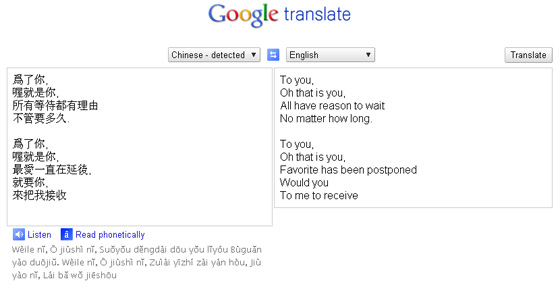Listening and watching… and trying to keep up with Asian entertainment means that I use Google Translate often. This is why I think these are new features. I knew Google Translate could read out loud English… and German, but this is the first time that I’m aware it can read Japanese, Mandarin and Korean too.

Of course I chose BiBi’s Just to Meet You song to test, because that’s one of the songs that I butcher whenever it plays on my iPod. And it not only “translates,” but now you can also read it phonetically…
and you can listen to it read it out loud. O_O
Three very important things about this:
1. This is amazing… if you’re starting out a language.
2. A lot of sites that dedicate themselves to pinyin, romaji and Korean romanization just got their work cut down… or have some serious competition. With this, anyone can post lyrics…
3. This just made a whole new generation of lazy.

